The Taiwan-India Strategic Dialogue was organized by the Prospect Foundation in Taipei. Dr Arvind Gupta, Lt Gen Ravi Sawhney and Dr Teshu Singh participated in the dialogue from the Vivekananda International Foundation (VIF). Amb. Tan-Sun Chen, I-Chung Lai, Dr Cheng-Yi Lin, Prof Mumin Chen, Norah Huang and Sophia participated from the prospect Foundation in the dialogue. Amb. Tan-Sun Chen delivered the welcome remarks and the opening remarks were given by Dr Arvind Gupta. The discussion was divided into two sessions: Developments of Power Dynamics in the Indo-Pacific and India-Taiwan Way Forward.
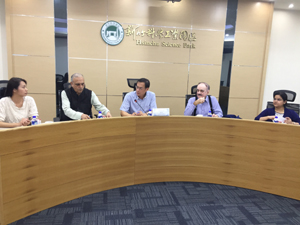 The delegation had interaction with the Chien-Jen Chen, Vice President of Taiwan, Arthur Iap, Deputy Security General, National Security Council, Dr Hsu Szu-Chien, Deputy Minister of Foreign Affairs, Yu-Chin Hsu, Deputy Minister of Science and Technology and John Chen-Chung Deng, Chief Negotiator, office of the trade negotiation, Executive Yuan.
The delegation had interaction with the Chien-Jen Chen, Vice President of Taiwan, Arthur Iap, Deputy Security General, National Security Council, Dr Hsu Szu-Chien, Deputy Minister of Foreign Affairs, Yu-Chin Hsu, Deputy Minister of Science and Technology and John Chen-Chung Deng, Chief Negotiator, office of the trade negotiation, Executive Yuan.
Developments of Power Dynamics in the Indo-Pacific
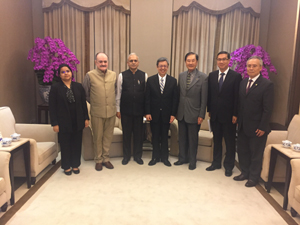 The Indian participants explained the reason for China being a challenge in the Indo-Pacific region. The Indian participants stated that the three factors that have contributed to the success of the Indo-Pacific are the rise of Asia, resurgence of maritime domain and convergence of strategic threats. On the issue of Quad, Indian participants explained the nature and purpose of the evolution of Quad and stated that it was essentially an organizational framework aimed at restoring order and a sense of strategic certainty where countries have to play by the accepted norms and rules. Being the biggest regional powers-India, Japan, United States and Australia seek to reinforce a free, open, and inclusive and rules-based regional order in the region.
The Indian participants explained the reason for China being a challenge in the Indo-Pacific region. The Indian participants stated that the three factors that have contributed to the success of the Indo-Pacific are the rise of Asia, resurgence of maritime domain and convergence of strategic threats. On the issue of Quad, Indian participants explained the nature and purpose of the evolution of Quad and stated that it was essentially an organizational framework aimed at restoring order and a sense of strategic certainty where countries have to play by the accepted norms and rules. Being the biggest regional powers-India, Japan, United States and Australia seek to reinforce a free, open, and inclusive and rules-based regional order in the region.
The Indian Participants reiterated PM Modi’s Shangri La speech in 2017 and stated that the principle of ‘inclusivity’ is not the hesitation to criticize China, but a conscious effort at building a principled regional order. On the issue of Taiwanese participation in the Indo-Pacific, new framework such as an Indo–Pacific Regional Maritime Monitoring Authority should be established for Maritime Domain Awareness (MDA) that will allow for Taiwan’s participation. In an optimist note the Indian participants suggested that if not at the Quad level, there should be stronger cooperation in a trilateral format with Taiwan’s Coast Guard. Taiwan should be invited to participate in Quad’s discussions and initiatives on increasing connectivity in the region.
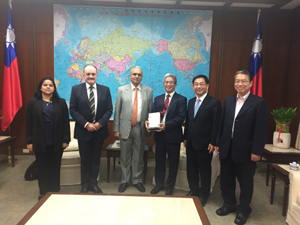 The Taiwanese participant explained the Indo-Pacific Security Development in the context of US-China Development. The three pillars of Indo-Pacific are digital connectivity and Cybersecurity Partnership, Infrastructure Transaction and Assistance Network and Enhancing Development and Growth through Energy, the Taiwanese participants argued. They explained about the Chinese reaction to the concept of the Indo-Pacific and stated China is ready to accept the concept of the Indo-Pacific if it is combined with the ‘community of shared destiny future for mankind’ or the ‘Belt and Road Initiative’.
The Taiwanese participant explained the Indo-Pacific Security Development in the context of US-China Development. The three pillars of Indo-Pacific are digital connectivity and Cybersecurity Partnership, Infrastructure Transaction and Assistance Network and Enhancing Development and Growth through Energy, the Taiwanese participants argued. They explained about the Chinese reaction to the concept of the Indo-Pacific and stated China is ready to accept the concept of the Indo-Pacific if it is combined with the ‘community of shared destiny future for mankind’ or the ‘Belt and Road Initiative’.
On the issue of the United States and the South China Sea, the Taiwanese participant reiterated Admiral John Richardson (Chief of US Naval Operations) remarks of enforcing the rules designed to govern encounters between navies and extend them to coastguards and maritime militias that Beijing has used to advance its sovereignty claims in the South and East China seas. The Taiwanese participants further stated that linking the United States and the ASEAN Maritime Command and Control centre through the installation of secure information-sharing networks, and field information support tool communications systems can be useful.
 On the plausible role of Taiwan in the Indo-Pacific region, the Taiwanese participants said that the United States has acknowledged that the democracies in the Indo-Pacific namely; Singapore, Taiwan, New Zealand, and Mongolia are reliable, capable, and natural partners. Additionally, Taiwan is working with the US on the Dialogue on Securing Religious Freedom in the Indo-Pacific region, the Global Cooperation Training Framework (GCTF) and with the United States Overseas Private Investment Corporation (OPIC).
On the plausible role of Taiwan in the Indo-Pacific region, the Taiwanese participants said that the United States has acknowledged that the democracies in the Indo-Pacific namely; Singapore, Taiwan, New Zealand, and Mongolia are reliable, capable, and natural partners. Additionally, Taiwan is working with the US on the Dialogue on Securing Religious Freedom in the Indo-Pacific region, the Global Cooperation Training Framework (GCTF) and with the United States Overseas Private Investment Corporation (OPIC).
India-Taiwan, the Way Forward
The Taiwanese Participant highlighted the popularity of India’s soft power and raised the issue of the certain impediment in bilateral relations. The Taiwanese participants were optimistic about the re-election of the Modi Government, and were hopeful that it would also mark a new phase in India-Taiwan relations. They highlighted the role of education in promoting relations. There are a larger number of Indian students in Taiwan as compared to South Korea and Japan. The number of tourist from both sides are increasing but it is still not satisfactory. The Taiwanese participant also mentioned that major impediment in promoting the bilateral relations werethe restriction put on the visit of ministers from both sides. The Taiwanese participants mentioned that the platform of Parliamentary friendship Association has not been utilized well until now.
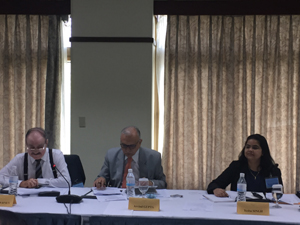 Indian Participants gave a detailed account of the India-Taiwan relations. They elaborated on the important dimension of the India-Taiwan relations - Trade and Investments, Education, Science and Technology and People to People Exchanges. Indian participants highlighted the important role education has played in between two countries. There are already 116 MoUs/Agreements between 73 Universities/colleges on Taiwanese side and 96 Universities/ colleges on Indian sides. Around 15 Taiwanese teachers are teaching Mandarin in India and around 2300 Indian students are studying various courses in Taiwan. There is around 35000 Indian Tourist visiting Taiwan and around 3000 Indian diasporas. Amidst the US-China trade war, as the Taiwanese companies are shifting from China, India could be a plausible destination. India is a big market for Taiwan. This can help Taiwan in reducing its dependence on China which is the stated aim of the New Southbound Policy. Indian participants also mentioned that the main hurdle in the bilateral relationship is the One-China Policy and the absence of diplomatic relations between the two sides.
Indian Participants gave a detailed account of the India-Taiwan relations. They elaborated on the important dimension of the India-Taiwan relations - Trade and Investments, Education, Science and Technology and People to People Exchanges. Indian participants highlighted the important role education has played in between two countries. There are already 116 MoUs/Agreements between 73 Universities/colleges on Taiwanese side and 96 Universities/ colleges on Indian sides. Around 15 Taiwanese teachers are teaching Mandarin in India and around 2300 Indian students are studying various courses in Taiwan. There is around 35000 Indian Tourist visiting Taiwan and around 3000 Indian diasporas. Amidst the US-China trade war, as the Taiwanese companies are shifting from China, India could be a plausible destination. India is a big market for Taiwan. This can help Taiwan in reducing its dependence on China which is the stated aim of the New Southbound Policy. Indian participants also mentioned that the main hurdle in the bilateral relationship is the One-China Policy and the absence of diplomatic relations between the two sides.
Assessment and Conclusion
- After the announcement of the Free and Open Indo-Pacific Strategy (FOIPs) by the United States, Taiwan has been among the countries that have been making an effort to come out with its response. Taiwan is trying to build on the three general pillars of FOIPs which U.S. officials have characterized as security, connectivity, and governance.
- According to the Taiwanese perspective, Indo-pacific along with New Southbound Policy has created a lot of opportunities. Taiwan is at the centre of the Indo Pacific, the geostrategic location of Taiwan should be utilized to reach to North Korea, South Korea, Japan and other countries.
- Amidst US-China trade war many countries are already approaching Taiwan to shift their companies to their respective countries. These delegations are coming with specific proposals. However, India has not approach any Taiwanese companies yet.
- The centre of Asian Economy is East Asia and not South Asia. Taiwan is looking forward to be an important player in the evolving geopolitics. India has also become an important player. A triangle consisting of India, Taiwan and Japan should be explored.
- In India-Taiwan relations it is important to decouple the economic logic from that of the other dimension of the relations. The various initiatives started by the Indian government has created a positive environment for Taiwanese companies to invest in India. To facilitate more investments from Taiwan, the interaction between the local governments and the Taiwanese Government should be encouraged.
- Cultural and civilizational link between both sides should be explored. India should use Yoga, culture and tourism as a common bond between the two sides. Tourism has a huge potential, a separate agreement on tourism is needed between the India Taipei Association and Taipei Economic and Cultural Center.
- Taiwan should follow the Japanese model of entrepreneurship. The Japanese companies not only set up their business in India but also give skill training to Indian. Recently, Japan has skilled 700 Indian in Japan before employing them in the companies.

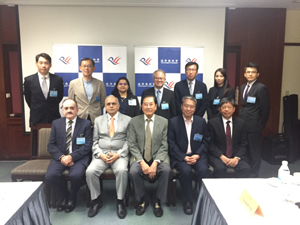


Post new comment